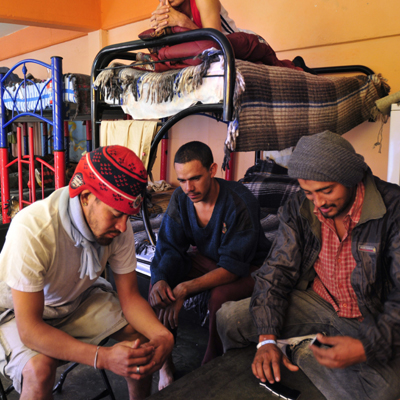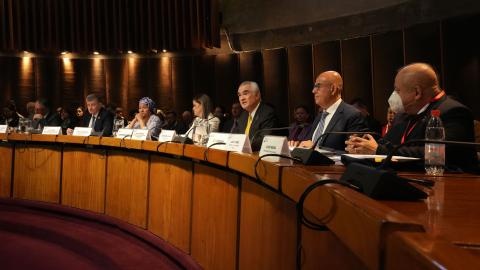Announcement
(4 October, 2013) International migration is a phenomenon with specific regional characteristics, which were presented by the Deputy Executive Secretary of ECLAC, Antonio Prado, at the Second High-Level Dialogue on International Migration and Development, which is being held as part of the 68th Session of the United Nations General Assembly in New York.
On behalf of the five UN regional commissions, the senior official from the Economic Commission for Latin America and the Caribbean (ECLAC) presented the main messages from discussions organized by the commissions in collaboration with the International Organization for Migration (IOM), with a view to examining the main aspects of migration and providing input to the international dialogue from a regional
perspective.
During his address, Mr. Prado emphasized three common features to arise from those discussions: the interconnection between international migration, development and human rights; the increase in South-South and intraregional migration; and the significance of labour migration and the protection of the rights of migrant workers (particularly women).
According to Mr. Prado "Immigrants in an irregular situation are particularly vulnerable to various forms of abuse. They find it difficult to
access social services such as health, education and housing", and he added that States must seek ways of eliminating the stigma attached to these people.
The Deputy Executive Secretary also presented suggestions from the preparatory meetings organized by the five regional conferences, while also stating: "First, we must take concrete action on the respect for migrants' human rights".
He highlighted the importance of increasing cooperation between countries of origin and destination, as well as strengthening the base of knowledge to promote public policies based on existing needs.
Mr. Prado declared "We hope to promote cooperation among States, as well as attempting to increase the involvement of all stakeholders at various levels - including non-governmental partners".
He also called for greater interactions between various national and regional actors involved in formulating and implementing migration policies.
He concluded by saying that "We should consider the inclusion of international migration on the post-2015 United Nations Agenda and all processes associated with regional population and development initiatives beyond 2014".
During his visit to New York, the Deputy Executive Secretary also took part in the event on "The Importance of Regional Dynamics to International Migration and Development", organized by IOM and the Governments of Peru and the Russian Federation on Wednesday 2 October at the United Nations Headquarters.
At the meeting, Mr. Prado stressed that regional discussions were a good opportunity for countries to have fruitful conversations to find practical recommendations and solutions to the most pressing issues in terms of migration, as well as establishing priorities for each region.
The senior official also attended the round table on "Assessing the effects of International Migration on Sustainable development and identifying relevant priorities in view of the preparation of the post - 2015 Development Framework", which was held on Thursday 3 October.
Any queries should be sent to the ECLAC Public Information and Web Services Section.
E-mail: prensa@cepal.org; Telephone: (56 2) 2210 2040.


